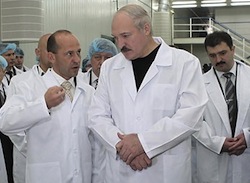EUobserver: Another Lukashenko's purse will fall under the sanctions
55- By Nickolaj Nielsen, EUobserver
- 19.06.2012, 11:19

The EU has said it does not rule out adding more people to its Belarus sanctions list so long as repression continues.
Minsk in April freed two prominent political prisoners - presidential candidate Andrei Sannikov and his aide Dmitry Bondarenko - but Gunnar Wiegand, a senior official in the European External Action Service (EEAS) told press in Brussels on Monday that it is not enough to mend relations.
"The release of two political prisoners has not put the ball in the EU's court. The ball remains in Minsk ... We could probably broaden the number of people on the travel ban," he noted.
Over 240 members of the Belarusian nomenklatura are currently forbidden from entering the EU or doing business in the single market.
The list includes Vladimir Peftiev and Yuriy Chizh, two oligarchs said to feed money to President Alexander Lukashenko, as well as an embargo on arms to Belarus and on goods that could be used for internal repression.
The EU has more top people in its crosshairs, such as Aleksandr Moshensky.
Moshensky, who runs a food and restaurant business called JV Santa Impex Brest, was instrumental in Lukashenko's 2010 presidential election campaign and is said to rank as the number three most influential tycoon behind Peftiev and Chizh.
Meanwhile, obstruction of human rights in Belarus is worsening.
Opposition and civil society are being increasingly harassed, with many given administrative sentences of up two weeks in prison.
The power and authority of the state security service, the KGB, has also been expanded. A recent law passed by Minsk now gives it the right to break into people's homes without a warrant, day or night.
Despite the bleak assessment, Wiegand said the sanctions are effective.
"The fact that we keep up the pressure on the government may very well have contributed to the release of some of the 23 political prisoners," he noted.
Among those still behind bars is human rights defender Ales Bialistki and political prisoner Syarhei Kavalenka.
Kavalenka - whose crime was planting a banned Belarus national white-red-white flag on top of a Christmas tree in Vitebsk - was diagnosed with hepatosis last week. He is serving a two-year sentence.
Bialiatski - the imprisoned head of the Belarus human rights center Viasna - is facing mounting prison restrictions for refusing to admit his guilt for alleged tax evasion. He is serving a four and a half year sentence.
Sannikov's spokesperson Alexander Atroshchonkau told EUobserver the EU's sanctions did contribute his boss's release.
"Targeted economic sanctions in today's form are quite symbolic ... [But] the system built by Lukashenko's clan is so ineffective that they are extremely sensitive to even very limited restrictive measures," he said.
Joerg Forbrig - an expert on Belarus at the Berlin-based NGO, the German Marshall Fund - also told this website the sanctions have influenced decision making.
Minsk, says Forbrig, released Sannikov and Bondarenko "to avert further and more painful EU measures."
He urged the EU to expand sanctions and to target Belarus oil exports.
Last year, crude oil and oil products accounted for 36 percent of Belarus' sales to the Union. Just over 16 percent was potash and fertiliser. In total, trade between the two surged by 69 percent in 2011 despite the political deep freeze.
Nickolaj Nielsen, EUobserver










